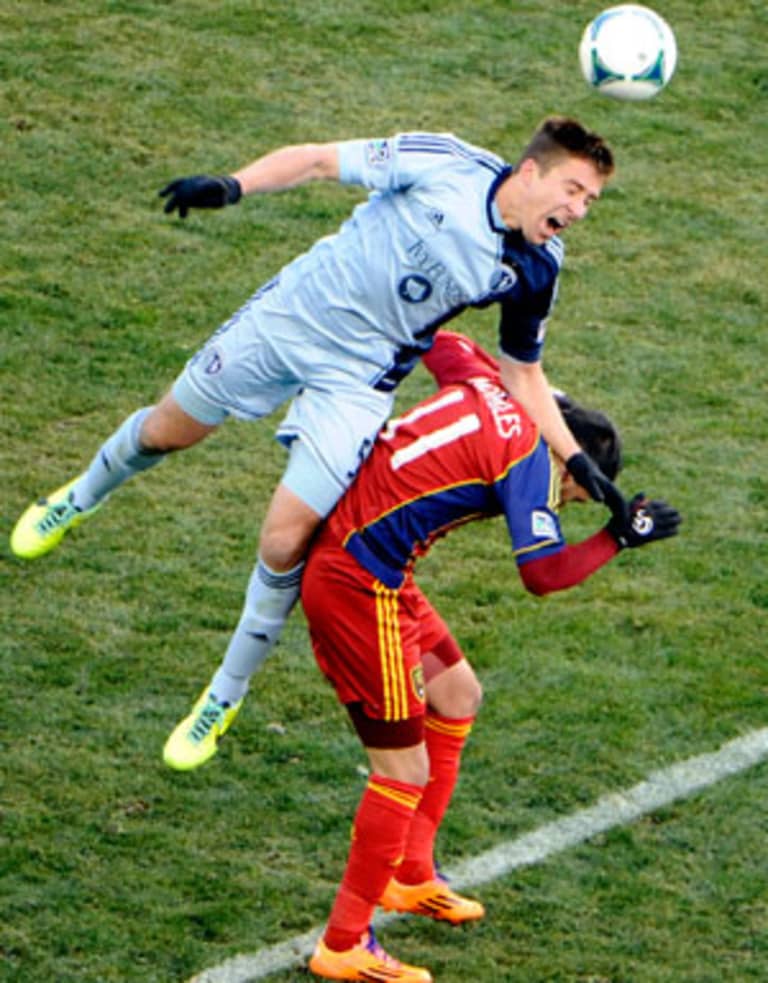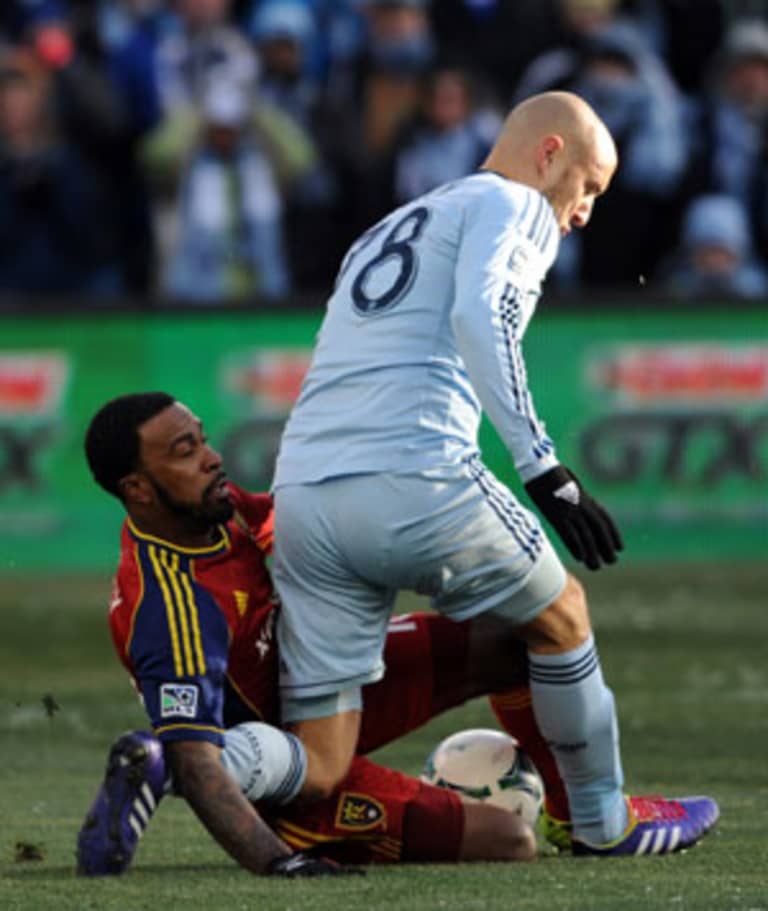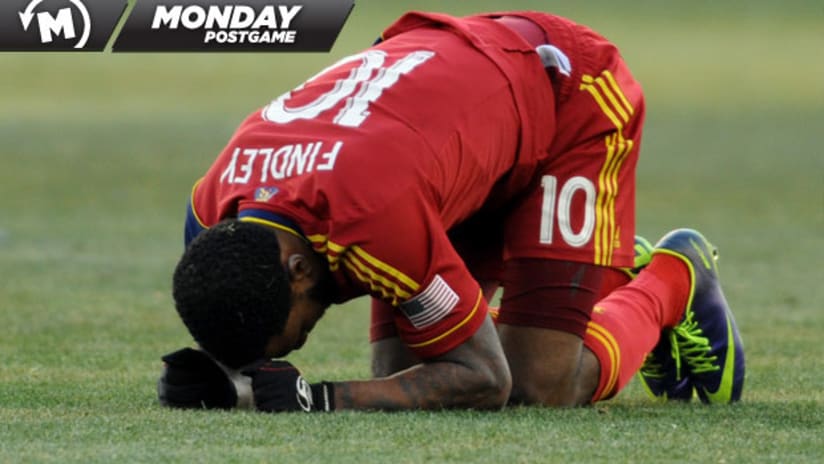Before you read on, please keep the following points uppermost in your mind: Real Salt Lake and Sporting Kansas City are both good teams who produced excellent seasons and deserved to be playing in MLS Cup 2013. They both field skillful players capable of playing fluid, attractive soccer.
They also staged a championship game on Saturday that was, for the most part (OK, half), a very entertaining affair, capped by a wildly dramatic, sudden-death shootout that (like all shootouts) would have been heartbreaking for either team to lose, and certainly hit RSL and their devoted fans like a sock full of quarters.
The “but” that’s coming up – and you know one is coming – isn’t about Real Salt Lake or Sporting Kansas City. It’s not about referee Hilario Grajeda, either.
It’s about the on-field tone and the style of play in MLS, especially with the league’s critics ready to pounce on the idea of too much physicality.
Because that game, especially the first half, was “wild,” as SKC coach Peter Vermes told ESPN during an interview at the break. He wasn’t talking about wild goals or swings of fortune, either: He was talking about wild, undisciplined challenges, “on both sides,” as he added.

The blood was rushing in the general direction of all players’ craniums in that first half on Saturday, and the result was not especially pretty.
As we said, this isn’t a criticism of Grajeda’s performance as the man in the middle. He set a tone and he mostly maintained that tone, which was this: Let them play. Despite handing out three yellow cards in the first half alone and calling 40 fouls before the match was said and done, he certainly allowed physical play on both sides of the ball, and both teams had a roughly equal number of legitimate gripes about decisions (calls made, or not made) that didn’t go their way.
It may have been a shoot-from-the-hip attempt at on-field justice, one that relied on good fortune to prevail, but justice more or less did prevail: The game could have gone either way – in regulation play, in extra time, and of course, in the coin flip that is penalties.
So … while diehards in Utah will complain after the heartbreaking loss (and they have some legitimate complaints; but so do SKC fans) they can’t pin this defeat on the refereeing. Both sides had ample opportunities to walk away winners from this one.
If Robbie Findley had placed his 29th-minute shot at an open net about one inch to the left, RSL would have had another goal. If just one of the excellent strikes by Kyle Beckerman and Javier Morales in the 62nd and 73rd minutes, respectively, had hit the side netting instead of the post, Jason Kreis’s men would have had an imposing 2-0 second-half lead.
Then there was the penalty shootout, and Sebastian Velasquez’s shot in particular. His attempt followed a miss by KC’s Lawrence Olum and would have won the game, and the title, for RSL if it had found its mark.
Sporting Kansas City missed golden opportunities as well: C.J. Sapong fired high from six yards in the 48th minute, and Claudio Bieler ripped a shot over the bar from 15 yards after a nice buildup by his teammates in the 79th.
The talking point here concerning the match – especially the first half – concerns how much, and what kind, of physical play MLS wants to allow in its games.
Back in October, commenting on a rough professional foul he received at the hands (or, more accurately, the feet) of Portland midfielder Diego Chara, Seattle attacker Clint Dempseysaid MLS's style was more “reckless” than the play in the English Premier League, where he’d spent the previous seven seasons making an international name for himself.
“Reckless” and “wild” are not the adjectives the league wants springing to mind about its games (much less its final), and you can bet that MLS and PRO, the referees organization, will continue to address the problem in the offseason.
PRO chief Peter Walton, for his part, told MLSsoccer.com on Monday that "being physical is not an issue" and that MLS is "neither less nor more physical than most major leagues around the world," while defending the job done by Grajeda on the league's biggest stage.
"I thought the first 20 minutes displayed players who were perhaps too hyped up and a little nervous of the occasion," Walton said via e-mail. "This resulted in a number of 'wild' challenges from both sides. The officials did not overreact, and used this time to manage the players with words of advice both on and off the ball. The players responded well and the game settled into a more balanced pattern thereafter."

As we detailed during Referees Week this season,
PRO officials check in with clubs regularly and with their referees weekly in an effort to maintain consistency in MLS officiating
. Presumably, they know the style they want to see, and they work to implement it.
So the question is, does that style allow too much physical play? Did Grajeda permit too much on Saturday? The latter probably depends on who you ask, but if you ask PRO, they seem comfortable with how their reigning Referee of the Year performed.
No league in the world is without dubious refereeing decisions, and there are reckless challenges in every circuit as well. But when a league establishes a level of consistency in the officiating, the players know what to expect; they know where the line is, and exactly how much they can and can’t push it – and the games are more controlled as a result.
Is MLS officiating less consistent than other leagues, or is it simply cultivating a more physical style of play that suits American soccer culture? It’s not as easy as you might think to tease out the differences. And there may be another element at play, in a league still in its teenage years: Some MLS refs are more experienced than others – a situation that could certainly affect consistency in the officiating.
As time goes on, and players and refs gain experience in the give-and-take of officiating highly competitive, physical matches, chances are you’ll see both sides get more comfortable – and provide fewer reasons for fans to grouse after matches.













